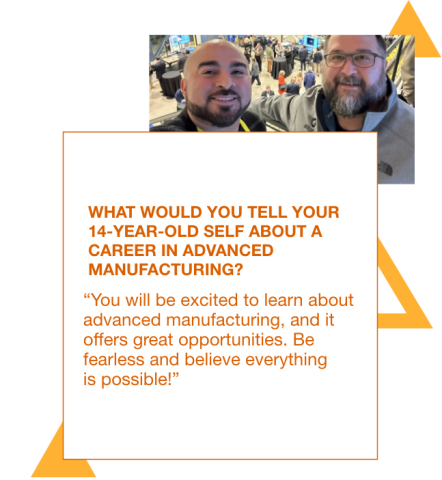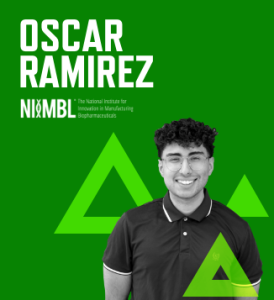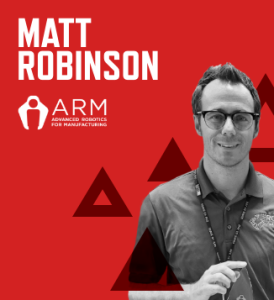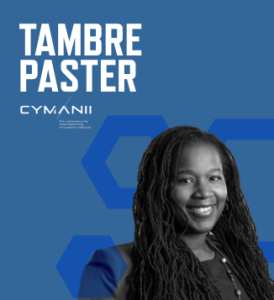
Manufacturing technology and robotics strategist, upskilling advocate, youth sports coach
Gregorio Balandran has seen up close how change is hard for organizations – and for people in advanced manufacturing whose jobs require precision and repetition. He is an engineer at heart, driven to find better ways to build and make products. It is no surprise that Gregorio finds himself showing manufacturers how to implement robotics in their shops in creative ways.
When working on automation projects with manufacturers, Gregorio has learned to work within a company’s culture to help them achieve their goals. He finds joy in helping others to see the benefits of incorporating robotics and to become advocates for transforming processes.
Gregorio is currently Director of Advanced Manufacturing at Amcor, a global leader in packaging solutions. He has expertise in implementing manufacturing technology and in developing a workforce with the skills they need to program and manage robotics. Gregorio helps shape the scope of the organization’s North American advanced manufacturing capabilities, aligning upskilled workers with processes and technology.
He has served on the Technical Advisory Council for the Advanced Robotics for Manufacturing (ARM) Institute, and helped build its landmark roboticscareer.org workforce platform. The platform helps people find training programs in robotics and includes information about robotics jobs, skills needed for each job, and general salary parameters. The ARM Institute focuses on strengthening U.S. manufacturing through innovations in robotics. Gregorio began working with the ARM Institute when he previously worked at Spirit AeroSystems.
Gregorio’s dedication to helping the industry adopt robotics exemplifies why he is a Modern Maker.
Q&A with Gregorio
How did you find your way to working in advanced manufacturing?
Early on, I was interested in automation strategy, and even though it was exciting to help bring robotics to the manufacturing floor, it wasn’t always clear what the impact would be on the organization’s bottom line. As I learned more about business models, I became more aware of the growing need for advanced manufacturing across the U.S. That led to partnering with national institutes like ARM to help strengthen America’s manufacturing footprint.


What is the most challenging part of your job?
The advanced manufacturing journey is audacious. Change can be a tough sell, and it takes the right teams – and their grit and determination – to help execute new initiatives. A leader in this space must be a pioneer and have the ability to quickly adapt.
What is the best part of your job?
We have the chance to enhance an organization’s manufacturing competitiveness.
Technologies and methodologies evolve over time, and leaders must continually innovate and do so collaboratively. The best part of my job is having the opportunity to empower people to become part of this journey, and then watching them grow and become leaders in transforming manufacturing.
What would people be surprised to learn about manufacturing or your role in it?
When I talk with people about how robotics is transforming manufacturing, it usually leads to a broader discussion about empowering people to leverage technology to improve their everyday lives.
What advice do you have for someone new to the industry?
I would advise them to be aware that manufacturing can be slow to change. They should learn to be patient while being persistent about expanding their knowledge and skills. As an example, there may be technology available to solve a problem at your organization, but implementation may be a cultural challenge. You must be disciplined and determined to see the transformation through. Advanced manufacturing often doesn’t yield results right away.
What makes you excited to go to work?
I’m an engineer at heart, so solving complex problems is part of my DNA. It’s meaningful to have the chance to help solve complex challenges that will make the facility safer for colleagues. I also feel lucky to be surrounded and supported by a great team and smart leaders.

What activity gives you the most energy?
What energizes me the most is when my team and I get in the trenches to navigate challenges and achieve eureka moments that lead to significant growth. It’s also energizing to see colleagues on the manufacturing floor embrace transformative initiatives.
What hobbies make you better at your career?
Having a good work-life balance is key. I have found that coaching my kids' football teams through the years has provided great enjoyment and fulfillment – that’s helped me to find that balance.
How does the work you do impact the world?
It will help shape manufacturing, both with regard to robotics integration and in providing safer jobs for people in the industry.




